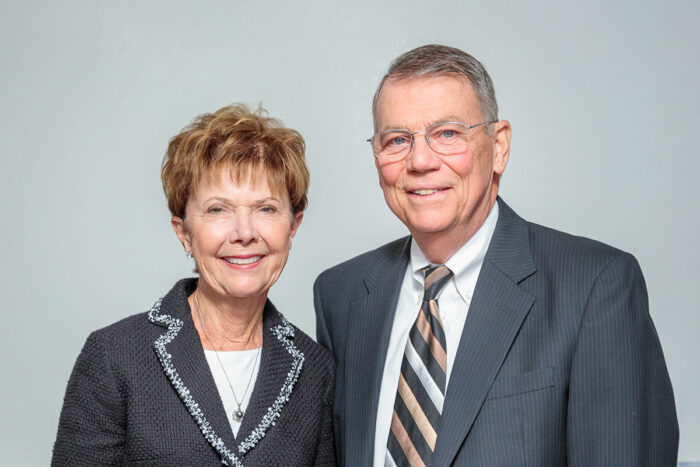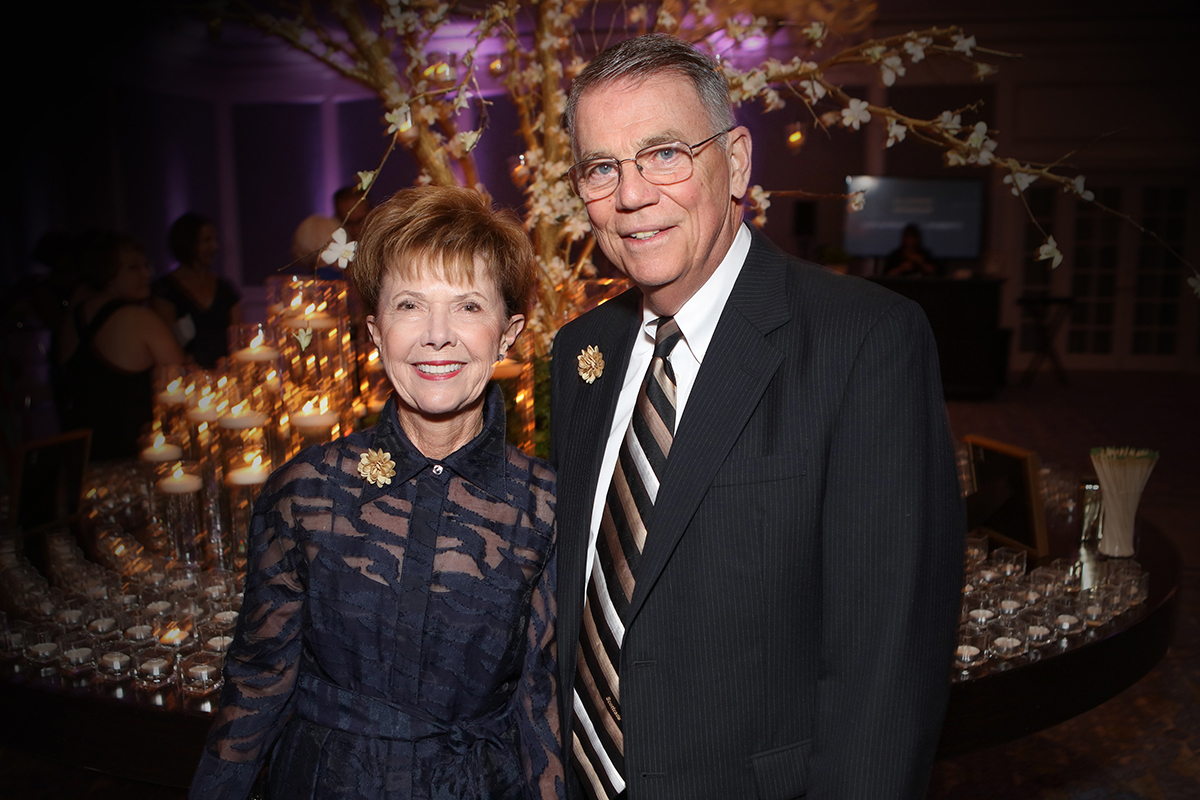Rineys give $15 million to develop, test therapies for neurodegenerative diseases
Gift will fund Alzheimer’s, Parkinson’s research
 Matt Miller
Matt MillerRodger and Paula Riney have made a $15 million gift to Washington University School of Medicine in St. Louis, aimed at accelerating research and developing new treatments for Alzheimer’s disease and Parkinson’s disease.
Washington University School of Medicine in St. Louis has received a $15 million gift from Paula and Rodger Riney aimed at accelerating research and developing new treatments for two major neurodegenerative diseases: Alzheimer’s disease and Parkinson’s disease. Of the gift, $10 million will support Alzheimer’s disease research, while $5 million will support studies of Parkinson’s disease.
The gift will help advance promising research that could benefit millions of people. While Alzheimer’s and Parkinson’s are distinct diseases, common threads run through both, such as in the way that neurons degenerate. The thinking is that fundamental discoveries related to either disease may lead to cures and treatments for other neurodegenerative diseases.
“The burden of Alzheimer’s and Parkinson’s continues to grow, and we are grateful to Paula and Rodger Riney for their extraordinary generosity,” said Chancellor Mark S. Wrighton. “Both diseases create enormous strains on patients, families and caregivers, and health-care systems, and the Rineys’ gift will support talented faculty working on the front lines to understand the process of neurodegeneration and identify potential treatments, with a goal of improving patients’ lives.”
Chancellor-elect Andrew D. Martin echoed the sentiment.
“With this gift, Paula and Rodger Riney have provided a tremendous boost to our research efforts aimed at neurodegenerative diseases,” Martin said. “I deeply appreciate their commitment to this vital area of research and their passion for improving the lives of those suffering from these devastating diseases.”
The Rineys have first-hand experience in dealing with the ravages of neurodegenerative diseases such as Alzheimer’s and Parkinson’s: Both had a parent who suffered from dementia, which occurs in all Alzheimer’s patients and 80 percent of Parkinson’s patients.
“The cost of Alzheimer’s and Parkinson’s on families and society is just devastating,” said Rodger Riney. “We felt we wanted to do something substantive to help solve these problems. We were very impressed with the work at Washington University to find effective treatments and improve early diagnosis for these diseases, and we wanted to make a significant investment that would accelerate this important research.”
Washington University is a world leader in the effort to discover the cause of and cure for Alzheimer’s disease, which affects 5 million people in the United States. The number of people living with the disease is expected to rise as the population ages. No therapies exist to prevent, delay or halt the development of the disease. The Rineys’ gift will aid Alzheimer’s treatment efforts led by John C. Morris, MD, the Harvey A. and Dorismae Hacker Friedman Distinguished Professor of Neurology and head of the university’s Charles F. and Joanne Knight Alzheimer’s Disease Research Center. With the Rineys’ support, the Knight Center plans to establish a center for Alzheimer’s clinical trials that will bring together investigators to evaluate drugs and new therapeutic and diagnostic approaches. That center will be led by B. Joy Snider, MD, PhD, a professor of neurology.
The Rineys’ gift also will establish a collection of Alzheimer’s biomarkers. Biomarkers are measurable signs of disease, such as atrophied brain tissue or clumps of the proteins amyloid beta and tau in the brain or in the cerebrospinal fluid that surrounds the brain and spinal cord. The collection will include brain scans from Alzheimer’s patients as well as samples of their blood and cerebrospinal fluid. The collection of biomarker data will aid the development of tools to diagnose the disease, predict its progression and monitor the effectiveness of treatment.
The School of Medicine’s strengths in neurodegenerative diseases go beyond Alzheimer’s. A distinguished leader in Parkinson’s research, the School of Medicine is also home to the Advanced Center for Parkinson’s Research, led by Joel S. Perlmutter, MD, the Elliot H. Stein Family Professor of Neurology. Parkinson’s disease is a progressive neurodegenerative disease in which patients slowly develop tremors and other movement difficulties. With the Rineys’ support, Perlmutter will develop imaging techniques to measure the brain activity of a potential drug treatment, a key step toward a clinical trial. He also will investigate how and why dementia develops in people with the disease. The gift also will fund a study led by Brad Racette, MD, the Robert Allan Finke Professor of Neurology, on the role of brain inflammation in Parkinson’s.
“We would like to express our deepest thanks to Paula and Rodger Riney for their generous gift,” said David H. Perlmutter, MD, executive vice chancellor for medical affairs, the George and Carol Bauer Dean of the School of Medicine, and the Spencer T. and Ann W. Olin Distinguished Professor. “Their support is a powerful catalyst for new avenues of research into some of the most common and devastating neurodegenerative diseases. We’re ready to take on such pressing challenges to improve human health and accelerate the development of more effective therapies.”
A St. Louis native, Rodger Riney founded the discount brokerage firm Scottrade and led the company until it was sold to TD Ameritrade in 2017. The Rineys are longtime community and nonprofit leaders, supporting social and research organizations in St. Louis and at the regional and national level, such as the Multiple Myeloma Research Foundation and the Alzheimer’s Association.
For the Rineys, this gift continues a history of generous financial support to Washington University. They have given $25 million to the School of Medicine to develop promising new treatments for the blood cancer multiple myeloma, including $20 million to establish the Paula C. and Rodger O. Riney Blood Cancer Research Initiative Fund. They also support the work of Alzheimer’s researcher Beau Ances, MD, PhD, the Daniel J. Brennan, MD, Professor of Neurology.
 Related: $20 million gift boosts multiple myeloma research
Related: $20 million gift boosts multiple myeloma research
Donation establishes Paula C. and Rodger O. Riney Blood Cancer Research Initiative Fund






